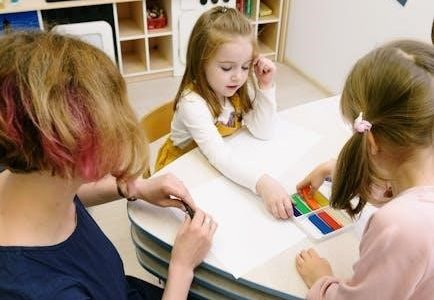
montessori method of teaching pdf
The Montessori method is a child-centered educational approach that supports natural abilities, fostering self-directed learning through hands-on activities in a specially designed environment.
Overview of the Montessori Method
The Montessori method is an educational approach that emphasizes child-centered learning, fostering independence and self-directed growth. It focuses on creating a prepared environment where children explore and learn through hands-on activities tailored to their individual needs. This method encourages children to develop at their own pace, supported by specialized materials and multi-age classrooms. Teachers act as facilitators, observing and guiding students to promote academic, social, and emotional development. By respecting each child’s unique potential, the Montessori method aims to empower learners to become confident, curious, and lifelong learners.
History and Evolution of the Montessori Approach
The Montessori method was developed by Italian physician Maria Montessori in the early 20th century. Initially, she worked with special needs children, developing sensory-based materials that fostered independence. Her success led to applying these methods to mainstream education. The approach spread globally, evolving to accommodate diverse cultural and educational needs while maintaining its core principles of child-centered learning and self-directed exploration. Over time, the method has been refined, incorporating modern educational research, yet remains true to Montessori’s vision of empowering children to reach their full potential.
Key Principles of the Montessori Method
The Montessori method emphasizes child-centered learning, respecting individual differences, and fostering self-directed exploration. It encourages hands-on activities and the use of specially designed materials to promote independence and critical thinking. The prepared environment is tailored to meet the child’s developmental needs, allowing for spontaneous learning and natural curiosity. This approach views children as eager learners, capable of educating themselves when provided with supportive tools and freedom to explore, fostering a lifelong love for learning and personal growth.

Maria Montessori and Her Contributions
Maria Montessori, an Italian physician and educator, pioneered the child-centered Montessori method, emphasizing self-directed learning and specialized materials that foster natural development and a child’s eager curiosity.
Maria Montessori: Biography and Early Work
Maria Montessori, an Italian physician and educator, was born in 1870 and became one of the most influential figures in early childhood education. Initially working in psychiatry, she shifted her focus to education after observing children’s natural learning processes. Her innovative approach emphasized child-centered learning, leading to the development of the Montessori method. Montessori’s early work laid the foundation for a revolutionary educational philosophy that valued self-directed learning and hands-on activities. Her book, The Montessori Method, detailed her observations and educational strategies, establishing her as a pioneer in child development and education.
Montessori’s Vision for Child-Centered Education
Maria Montessori envisioned education as a process where children are empowered to explore and learn independently. She believed in creating environments that nurture their natural curiosity and support their holistic development. This approach focuses on fostering self-directed learning, practical life skills, and social responsibility, viewing children as capable individuals rather than passive recipients of knowledge. Her vision emphasized the teacher’s role in guiding rather than instructing, allowing children to thrive at their own pace. This philosophy continues to inspire educational practices worldwide, promoting lifelong learning and personal growth.
The Development of the Montessori Method
The Montessori method evolved from Maria Montessori’s observations of children in the early 20th century. She developed specialized materials and activities that catered to their natural curiosity and learning patterns. Her approach emphasized hands-on, self-directed learning in a prepared environment. The method gained recognition after successful implementation in her first school, Casa dei Bambini. Over time, Montessori refined her techniques, incorporating insights from psychology and education. This led to a comprehensive system that fosters independence, critical thinking, and a love for learning, shaping modern educational practices globally.
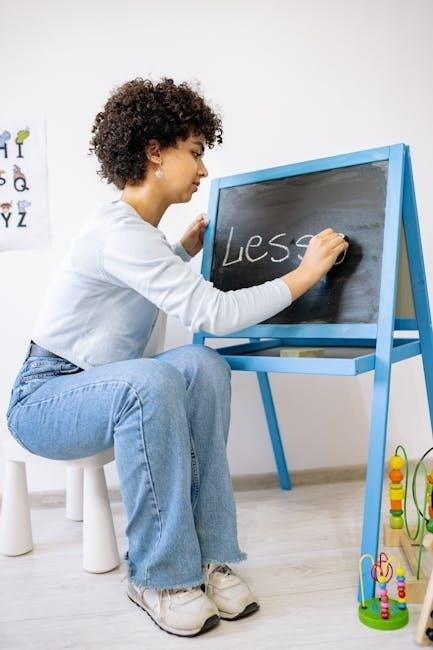
Core Principles of the Montessori Method
The Montessori method emphasizes child-centered learning, individual differences, and self-directed activities. It promotes hands-on experiences in a prepared environment, fostering independence and natural curiosity.
Child-Centered Learning and Individual Differences
The Montessori method prioritizes child-centered learning, respecting each child’s unique pace and interests. It encourages self-directed exploration, fostering independence and curiosity. By tailoring activities to individual differences, the approach empowers children to learn at their own rhythm, promoting confidence and personal growth. This emphasis on individuality supports the development of critical thinking and problem-solving skills, preparing children for future challenges while nurturing their natural love for learning.
Self-Directed Learning and Hands-On Activities
The Montessori method emphasizes self-directed learning, allowing children to explore concepts at their own pace. Hands-on activities are central, as they engage children in practical experiences that foster deeper understanding. Specialized materials are designed to promote independent discovery, enabling children to connect with learning in a meaningful way. This approach encourages curiosity, creativity, and problem-solving skills, helping children build confidence and a love for learning through active participation and personal discovery.
The Role of the Prepared Environment
The prepared environment in Montessori education is a specially designed space that fosters independence, curiosity, and self-directed learning. It includes carefully selected materials and activities tailored to a child’s developmental needs. This environment encourages exploration and discovery, promoting a sense of order and structure. Multi-age classrooms and open layouts further enhance collaboration and peer learning. The prepared environment supports the child’s natural eagerness to learn by providing accessible, hands-on materials that cater to individual interests and abilities, creating a nurturing and empowering space for growth.
Montessori’s View on the Child’s Natural Eager to Learn
Montessori believed children possess an innate eagerness to learn, driven by curiosity and a desire to explore their surroundings. She emphasized that education should nurture, not suppress, this natural inclination. By providing supportive environments and hands-on activities, the Montessori method guides children to discover and learn at their own pace. This approach fosters independence, self-confidence, and a lifelong love for learning, allowing children to thrive as active participants in their educational journey.
The Role of the Teacher in Montessori Education
The Montessori teacher acts as a facilitator, creating a nurturing environment that encourages self-directed learning and fostering independence, curiosity, and confidence in children.
The Teacher as a Facilitator and Mentor
In the Montessori method, the teacher acts as a facilitator and mentor, observing and supporting each child’s unique development. They create a nurturing environment, allowing children to explore and learn at their own pace. The teacher’s role is unobtrusive, fostering independence and confidence. Through specialized training, they guide students toward self-directed learning, ensuring individual needs are met. This approach encourages curiosity, creativity, and a love for learning, helping children develop into independent thinkers and lifelong learners.
Training and Qualifications of Montessori Teachers
Montessori teachers undergo specialized training to understand child development and create a supportive learning environment. They learn to observe and guide students individually, fostering independence and self-directed learning. The training emphasizes the use of Montessori materials and techniques to promote holistic development. Teachers are prepared to adapt their approach to each child’s unique needs, ensuring personalized education. This specialized training equips them to facilitate learning effectively, making them key enablers of the child-centered Montessori method.
Observation and Assessment in the Montessori Classroom
Observation is a cornerstone of the Montessori method, allowing teachers to understand each child’s learning pace and interests. Assessment focuses on progress monitoring rather than grading, emphasizing individual growth. Specialized materials help track developmental milestones, while the prepared environment encourages independent learning. Teachers use these insights to tailor activities, fostering a supportive and adaptive educational setting that nurtures each child’s unique potential and promotes holistic development.
Montessori Classroom Design and Materials
Montessori classrooms are thoughtfully designed to promote independence and hands-on learning, with specialized materials that cater to children’s natural curiosity and developmental needs.
Multi-Age Classrooms: Promoting Peer Relationships
Montessori classrooms often feature multi-age groupings, typically spanning three years, to foster peer relationships and collaborative learning. This setup encourages older children to mentor younger ones, promoting empathy, leadership, and social skills. The mixed-age environment allows for natural interactions, where children learn from one another and develop a sense of community. This approach supports emotional growth and prepares students for real-world interactions by valuing diversity and mutual respect among peers of different ages and skill levels.
Specialized Materials and Their Role in Learning
Montessori education utilizes specialized materials designed to promote hands-on, self-directed learning. These materials are tailored to specific developmental stages, encouraging children to explore and understand concepts through tactile experiences. They are constructed to foster independence, allowing children to learn at their own pace. The materials are often manipulative, enabling children to grasp abstract ideas concretely. This approach not only enhances academic understanding but also builds fine motor skills, hand-eye coordination, and problem-solving abilities, making learning both engaging and effective for young minds.
The Importance of Environment Design in Montessori
The Montessori environment is meticulously designed to foster independence, curiosity, and self-directed learning. Classrooms are organized to promote movement and exploration, with materials and activities tailored to developmental stages. The prepared environment encourages children to engage freely, fostering a sense of control and responsibility. It is structured yet flexible, ensuring accessibility and spontaneity. This design supports the child’s natural eagerness to learn, creating a nurturing atmosphere where they can grow intellectually, socially, and emotionally at their own pace.
Benefits and Effectiveness of the Montessori Method
The Montessori method fosters independence, self-directed learning, and holistic development, helping children become confident, curious, and eager learners in a supportive educational environment.
Academic Performance and Lifelong Learning
The Montessori method enhances academic performance by fostering self-directed learning and problem-solving skills. Students develop independence, critical thinking, and creativity, laying a strong foundation for future success. The approach encourages children to explore concepts at their own pace, promoting deeper understanding and retention. This personalized learning experience cultivates a love for learning, preparing individuals for lifelong intellectual growth and adaptability in an ever-changing world.
Social and Emotional Development in Montessori Students
Montessori education emphasizes social and emotional growth by fostering independence and respect for others. Multi-age classrooms encourage collaboration and empathy, allowing children to develop strong peer relationships; The method promotes self-awareness, self-regulation, and confidence, helping students navigate social dynamics and emotional challenges. By fostering a supportive environment, Montessori students often exhibit high levels of emotional intelligence and interpersonal skills, preparing them to thrive in diverse social settings and contribute positively to their communities.
Empirical Evidence Supporting the Montessori Approach
Research highlights the Montessori method’s effectiveness in fostering academic and personal growth. Studies show Montessori students often outperform peers in traditional settings, demonstrating superior problem-solving skills and social competence. Longitudinal studies, such as those from the University of Virginia, indicate Montessori-educated children exhibit better emotional regulation and collaboration. These findings underscore the method’s ability to nurture independent thinking and holistic development, supported by empirical evidence from diverse educational contexts.
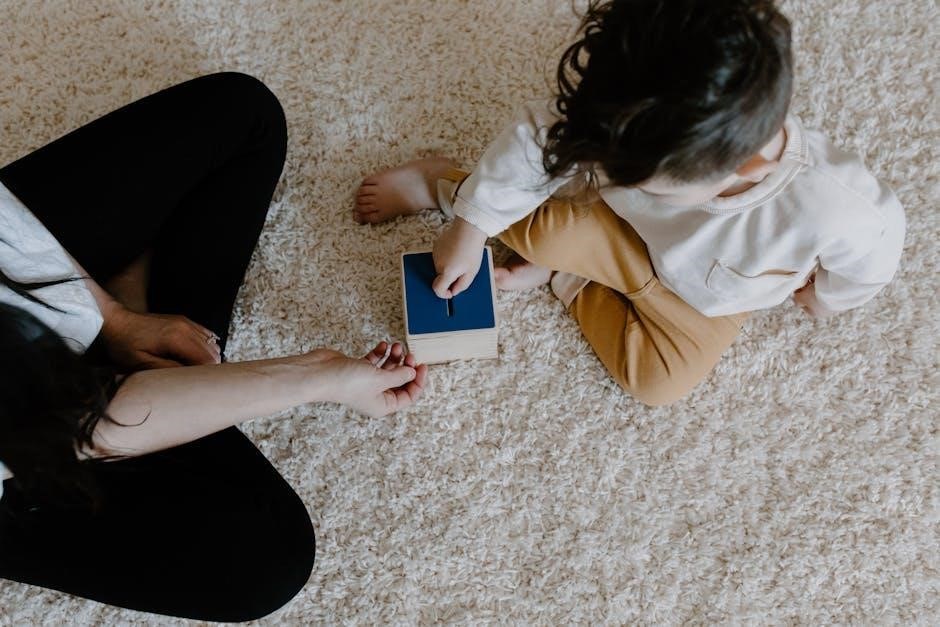
Criticisms and Challenges of the Montessori Method
Critics argue the Montessori method lacks structure, potentially hindering academic rigor. High costs and limited accessibility pose challenges, with some questioning its adaptability to diverse educational settings.
Common Criticisms of the Montessori Approach
The Montessori method has faced criticism for its lack of standardized implementation, as its success heavily depends on teacher training and environment preparation. Some argue it may not suit all learning styles, particularly those requiring more structure. Critics also point out that the emphasis on individual work can sometimes neglect collaborative skills. Additionally, the cost of Montessori education and the availability of trained teachers can limit accessibility for many families. These factors have led to debates about its universal applicability and effectiveness across diverse student populations.
Challenges in Implementing the Montessori Method
Implementing the Montessori method presents challenges, including the need for highly trained teachers and specialized materials. The approach requires a prepared environment, which can be resource-intensive. Additionally, its emphasis on self-directed learning may not align with traditional assessment methods, making it difficult to measure progress in conventional ways. Furthermore, the multi-age classroom setup can pose logistical challenges for schools with limited resources or rigid scheduling. These factors highlight the need for careful planning and commitment to uphold the method’s core principles effectively.
Cultural and Adaptability Issues in Montessori Education
The Montessori method, rooted in a specific cultural and historical context, may face adaptability challenges in diverse settings. Its emphasis on individualized learning can conflict with cultures valuing collectivism or traditional teaching methods. Additionally, the approach’s reliance on specialized materials and trained teachers can limit its adoption in resource-constrained environments. Cultural differences in educational expectations and societal values may require modifications to the method, posing challenges for maintaining its core principles while ensuring relevance and effectiveness across varied cultural landscapes.

Montessori Education in Different Settings
Montessori education is applied in early childhood, special needs, and homeschooling, adapting its child-centered approach to diverse learning environments while maintaining core principles of self-directed learning.
Montessori in Early Childhood Education
Montessori early childhood education emphasizes child-centered learning, fostering independence and curiosity in multi-age classrooms. Hands-on activities and specially designed materials encourage cognitive, social, and emotional growth. The prepared environment supports self-directed exploration, allowing children to develop at their own pace. This approach nurtures a lifelong love of learning and prepares young children for future academic and personal success by focusing on practical life skills, sensory awareness, and social interaction. It lays a strong foundation for holistic development in early years.
Montessori in Special Needs Education
Montessori education adapts well to special needs, offering personalized learning experiences that cater to each child’s unique requirements. The method emphasizes individualized instruction, allowing children with special needs to progress at their own pace. Hands-on materials and tailored activities support diverse learning styles, fostering independence and confidence. Teachers are trained to observe and assist, creating a supportive environment that addresses specific challenges while promoting overall development. This approach ensures inclusive education, helping children with special needs thrive academically, socially, and emotionally within a nurturing setting. Montessori’s flexibility makes it a valuable option for diverse learners.
Montessori in Homeschooling and Alternative Education
Montessori principles are increasingly applied in homeschooling and alternative education settings, offering families flexibility and personalized learning. Parents adapt Montessori materials and methods to create child-centered environments at home. This approach allows for tailored instruction, accommodating individual learning styles and pacing. Homeschooling parents benefit from Montessori’s emphasis on self-directed learning, fostering independence and curiosity. Alternative education programs also integrate Montessori techniques, providing innovative solutions for diverse learners. This adaptability makes Montessori a popular choice for families seeking non-traditional, effective educational pathways that prioritize child development and holistic growth. Families worldwide embrace this method for its versatility and proven results.
Comparisons with Traditional Education
Montessori differs from traditional education by emphasizing child-centered, self-directed learning and hands-on activities, contrasting with the structured, teacher-led approach of conventional classrooms.
Montessori vs. Traditional Education: Key Differences
The Montessori method emphasizes child-centered, self-directed learning with hands-on materials, fostering independence and individualized instruction. In contrast, traditional education often follows a rigid curriculum, with teacher-led instruction and standardized testing. Montessori encourages exploration and peer collaboration, while traditional classrooms focus on rote memorization and structured schedules. The Montessori approach views children as naturally curious learners, providing a nurturing environment for holistic development, whereas traditional education often prioritizes academic achievement over personal growth. These differences reflect fundamentally distinct views on how children learn and develop.

Future Directions and Adaptations
The Montessori method is evolving to meet modern educational needs, integrating technology and cultural adaptability while maintaining its child-centered, self-directed learning core principles and emphasis on holistic development.
Modern Adaptations of the Montessori Method
The Montessori method is being adapted to modern educational needs by integrating technology, such as digital learning tools, while maintaining its core principles of self-directed learning and individualized attention. Cultural adaptability is also a focus, ensuring the approach remains relevant in diverse global settings. These adaptations aim to enhance the child-centered philosophy, fostering independence and critical thinking in contemporary classrooms. The inclusion of modern materials and innovative teaching strategies ensures the Montessori method remains effective and responsive to the evolving needs of today’s students.
The Role of Technology in Montessori Education
Technology is being integrated into Montessori education to enhance learning experiences while preserving core principles. Digital tools, such as interactive educational apps and virtual field trips, complement hands-on activities, offering new ways to explore concepts. Adaptive software supports personalized learning, catering to individual needs. Technology also facilitates global connections, broadening students’ perspectives. However, it is used judiciously, ensuring it does not overshadow the importance of practical life skills and face-to-face interactions. This balanced approach aims to prepare students for a modern, interconnected world while staying true to Montessori’s child-centered philosophy.
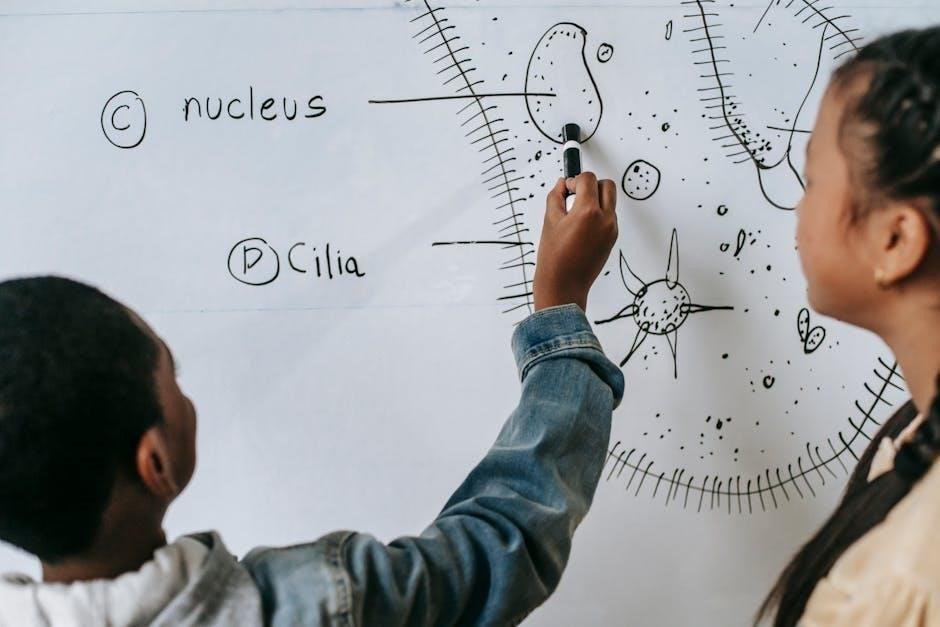
Case Studies and Testimonials
Montessori schools share success stories highlighting improved academic performance, social skills, and emotional growth. Parents and alumni often testify to the method’s positive impact on independence and creativity.
Success Stories from Montessori Schools
Montessori schools worldwide report remarkable success stories, showcasing students who excel academically and socially. These narratives highlight improved self-confidence, enhanced creativity, and a strong foundation for lifelong learning. Alumni often attribute their achievements to the method’s emphasis on self-directed learning and the supportive environments provided in Montessori classrooms. Parents frequently share testimonials about their children’s accelerated development, underscoring the method’s ability to foster independence and a love for learning from an early age. These success stories serve as powerful evidence of the Montessori approach’s effectiveness.
Testimonials from Parents and Students
Parents and students alike praise the Montessori method for fostering independence, creativity, and a deep love for learning. Many parents report observing significant improvements in their children’s self-confidence and academic skills. Students often express gratitude for the freedom to explore and learn at their own pace, highlighting the method’s ability to nurture individual potential. Testimonials frequently emphasize the positive impact of Montessori education on social and emotional growth, with many crediting it for shaping their success in later life. These personal accounts underscore the method’s transformative power.
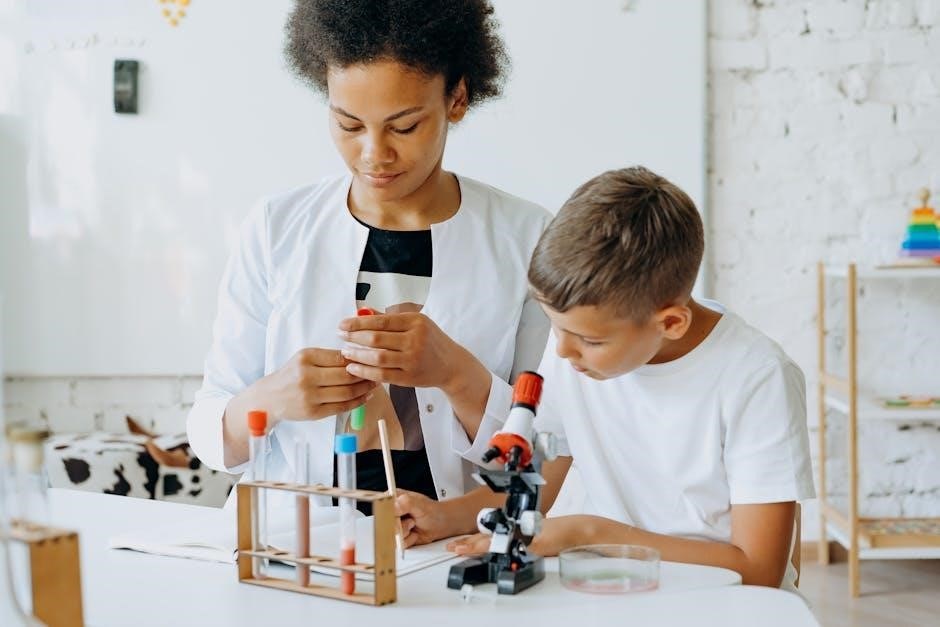
Resources for Further Reading
Recommended books include The Montessori Method by Maria Montessori and The Absorbent Mind. Online resources and educational communities provide additional insights into implementing the Montessori approach effectively.
Recommended Books on the Montessori Method
The Montessori Method by Maria Montessori is a foundational text, offering insights into her educational philosophy. The Absorbent Mind further explores child development. Montessori: The Science Behind the Genius by Angeline Stoll Lillard provides scientific validation of the approach. For practical guidance, Montessori from the Start by Paula Polk Lillard and Unforming You by Tim Seldin are invaluable. These books provide comprehensive understanding and practical applications of the Montessori method for educators and parents alike.
Online Resources and Communities
numerous online resources and communities provide valuable insights into the Montessori method. Websites like montessori.org and amshq.org offer detailed guides, research, and course materials. Online forums such as Montessori Forum and Facebook groups like Montessori Teachers Support Group connect educators and parents worldwide. Platforms like Coursera and Udemy host courses on Montessori principles. Blogs such as The Montessori Life and YouTube channels like Montessori Made Easy share practical tips and demonstrations, fostering a global community of learners and practitioners.
The Montessori method empowers children through self-directed learning, fostering independence and a lifelong love for education within a supportive, nurturing environment.
Summarizing the Montessori Method’s Impact
The Montessori method has profoundly influenced education by fostering independence, self-motivation, and a deep love for learning in children. By emphasizing child-centered, hands-on experiences, it promotes holistic development, including social-emotional growth and academic excellence. The approach encourages children to explore at their own pace, building confidence and critical thinking skills. Its focus on individualized learning and prepared environments has made it a transformative educational model, preparing students to thrive in an ever-changing world while maintaining a strong foundation for lifelong success.
The Future of Montessori Education
The Montessori method is poised to evolve by integrating technology and adapting to modern educational needs while maintaining its core principles. Its emphasis on child-centered learning and hands-on activities will remain central, but digital tools will enhance engagement and accessibility. As schools seek innovative approaches, Montessori’s flexibility allows it to thrive in diverse settings, from traditional classrooms to homeschooling. By blending tradition with innovation, the Montessori method will continue to empower children globally, fostering lifelong learners who are adaptable and resilient in a rapidly changing world.